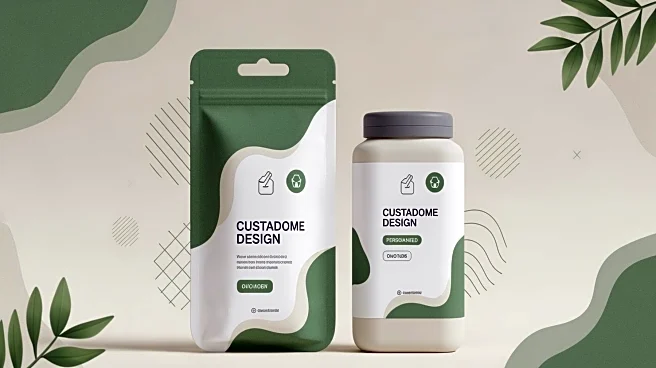What's Happening?
Think Tank Creative, a UK-based packaging design agency, has unveiled its predictions for packaging trends in 2026. The agency highlights a continued shift towards sustainable packaging solutions, with paper-based products gaining popularity due to their
cost-effectiveness and lower environmental impact compared to plastic. Additionally, larger brands are exploring bio-based materials such as sugarcane fibers and coconut husks, which are biodegradable and renewable. The agency also anticipates a rise in modular packaging systems that allow for closed-loop options, where customers can return used components for sterilization and reuse. Personalization and subscription models are expected to grow, with packaging playing a crucial role in enhancing consumer experience through thoughtful design and functionality.
Why It's Important?
The shift towards sustainable packaging is significant as it aligns with increasing consumer demand for eco-friendly products, particularly among Gen Z and Millennials. Brands that fail to communicate their environmental credentials risk losing these key demographics. The move towards personalized and subscription-based packaging reflects a broader trend in consumer behavior, where customers seek tailored experiences and convenience. This trend could lead to increased brand loyalty and customer satisfaction. Furthermore, the exploration of bio-based materials and modular systems represents a potential reduction in environmental impact, contributing to global sustainability efforts. Companies that successfully integrate these trends may gain a competitive edge in the market.
What's Next?
As brands continue to adopt sustainable and personalized packaging solutions, they may need to invest in research and development to explore new materials and designs. The integration of AI-driven consumer insights could further enhance personalization, allowing brands to predict customer needs and reduce overproduction. Additionally, the refill model in cosmetics may evolve to become more user-friendly and convenient, potentially through subscription services or in-store refill stations. Brands that effectively educate consumers and offer attractive refill options may see increased adoption of these models. The ongoing focus on sustainability and personalization is likely to drive innovation in the packaging industry.
Beyond the Headlines
The emphasis on sustainable packaging reflects broader societal shifts towards environmental consciousness and responsible consumption. As consumers become more aware of their impact on the planet, brands are increasingly expected to demonstrate eco-friendly practices. This trend may influence regulatory policies and industry standards, pushing companies to adopt greener solutions. The rise of AI in packaging design also highlights the intersection of technology and creativity, where human-led teams are valued for their ability to create unique brand experiences. The balance between automation and innovation will be crucial in shaping the future of packaging.















